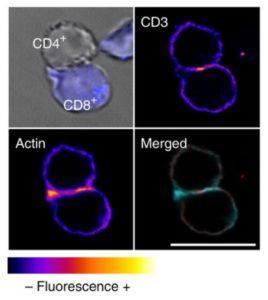CD8 T cells mediate defences against intracellular microbes and cancer via the recognition of antigen on major histocompatibility complex I (MHC-I), a molecule expressed by all almost cell types. However, professional antigen presenting cells (APCs) such as Dendritic cells (DCs), macrophages and B cells are responsible for priming functional CD8 T cells.
CD4 T cells are well known as T helper cells and potentially necessary for the generation of functional memory CD8+ T cells, however the exact mechanism of this is unknown.CD4 T cells undergo transphagocytosis, a process by which CD4 T cells capture bacteria from DCs. Transphagocytic CD4 T cells (tpCD4) have the ability to kill internalised bacteria, and it is suggested that this mechanism could be used to present antigen to other cells via MHC-I. Cruz-Adalia et al. aimed to determine if tpCD4 T cells are true APCs and have the ability to prime functional memory CD8+ T cells.
Cruz-Adalia et al. demonstrate that tpCD4 T cells can present antigens to naïve CD8+ T cells inducing proliferation by 2 days of co-culture with high expression of activation molecules, CD25 and CD69. This priming mechanism is dependent on internal MHC-1 pathway, and not sampling of antigens pre-loaded on to MHC-1 from DCs. CD8+ T cells primed via tpCD4 T cells expressed relatively high levels of CD127, CD62L and CD44, with low expression of PD-1. Additionally, CD8+ T cells primed by tpCD4 T cells have the ability to control Listeria monocytogenes infection, and control cancerous growth with reduced tumour size and increased survival of 67% compared to 0% in control mice.
In summary, Cruz-Adalia et al. demonstrated that tpCD4 T cells are capable of priming naïve CD8 T cells, that have a predominantly central memory profile with low PD-1 expression. Additionally, the ability of CD8 T cells primed by tpCD4 T cells to restrict tumour growth, make tpCD4+ T cells a potential cancer therapeutic.
Journal Article: Cruz-Adalia et al. 2017. Conventional CD4+ T cells present bacterial + antigens to induce cytotoxic and memory CD8 T cell responses. Nature Communications.
Article by Cheleka AM Mpande












